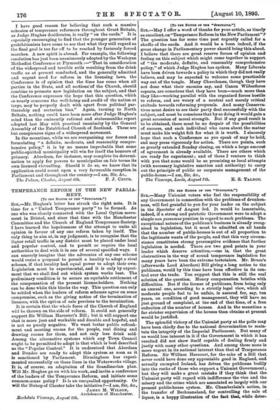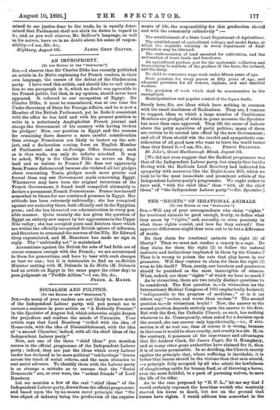[TO THE EDITOR OF THE "SPECTATOR.") SIR,—Many Unionist voters who
feel the responsibility of any Government in connection with the problems of drunken- ness, will feel grateful to you for your leader on the subject in the Spectator of August 3rd. It would be lamentable, indeed, if a strong and patriotic Government were to adopt a simple non possumus position in regard to such problems. The exceptional nature of the publican's business is already recog- nised in legislation, but it must be admitted on all handa that the number of public-houses is out of all proportion to the legitimate wants of the people, and that this very circum- stance constitutes strong presumptive evidence that further legislation is needed. There are two good points in your leader which deserve attention,—one is, that the great obstructives in the way of sound temperance legislation fos many years have been the extreme teetotalers. Mr. Bruce's (afterwards Lord Aberdare) Bill giving a long notice to the publicans, would by this time have been effective in its con- trol over the trade. You suggest that this is still the real solution of the question. Money compensation bristles with difficulties. But if the license of publicans, from being only an annual one, according to a strictly legal view, which all moderate people feel to be unfair, is assured for, say, ten years, on condition of good management, they will have no just ground of complaint, at the end of that time, of a free reduction of the number of houses. And in the meantime a far stricter supervision of the houses than obtains at present would be justified.
The splendid victory of the Unionist party at the polls may have been chiefly due to the national determination to main- tain the integrity of the Imperial Parliament. But many of us would lose interest in it if the Government in which it haa resulted did not show itself capable of dealing firmly and justly with many other questions. And among these none is more urgent in its national interest than that of Temperance Reform. Sir William Harcourt, for the sake of a Bill that. never could have done any appreciable good in England, and actually exempted Ireland, has driven the publicans bodily into the ranks of those who support a Unionist Government. but they will make a great mistake if they think that the Unionist party will regard with indifference the vice and the misery and the crime which are associated so largely with our- present public-house system. Mr. Chamberlain's action, in. the transfer of Bechuanaland, for controlling the sale of liquor, is a happy illustration of the fact that, while deter-
mined to see justice done to the trade, be is equally deter- mined that Parliament shall not shirk its duties in regard to it; and, as you well observe, Mr. Balfour's language, as well as his natnre, leave us in no doubt about his sense of respon- sibility.—I am, Sir, &c.,



































 Previous page
Previous page